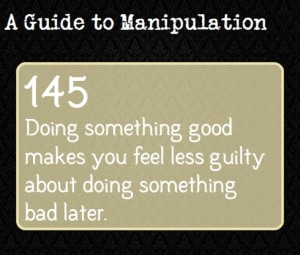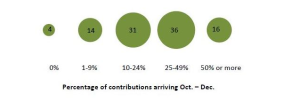Have you ever suffered through a long week of exams and felt the need to reward yourself with alcohol on the weekend? Did you ever complete a really intense workout session in which afterwards you allowed yourself to eat a candy bar? These are both examples of moral licensing in the most obvious of forms. Moral licensing effect is a term that not many of us are familiar with. It demonstrates our capability to compensate our good behavior with not so good behavior. It is a common act amongst humanity that challenges our will power and stifles our progress in life. Often times we take large strides forward in life, creating a positive self image, just to turn back around. In the examples I provided, the person is clearly demonstrating licensing effects; but often times it is not so easy to identify. In many cases a person will very subtly demonstrate this form of exchanging the “good” with the “bad”. More specifically, numerous studies show a correlation between donating to charity and self-licensing. A lot of evidence points to donation causing a decrease in good deeds, as well as past good deeds causing a decrease in charitable donations.
Donating to charity is one of the most widely appreciated acts in America. If someone donates to charity, not only does it create a better world, but it also causes a positive self image. With the holiday season coming up, you can be sure to see a plethora of opportunities to participate in charitable cases. It is one of the most popular times of the year to give to others less fortunate. In a study done by the center of philanthropy at Indiana University, they found that 42.7 percent of those surveyed gave more during the holidays then the rest of the year. While I believe this study may fail to identify respondent bias, or lack of honesty due to the protection of one’s self image, it does seem to ring true as we look around us during the winter season. Charitable giving is extremely common during the holiday season, but what follows the act may surprise you.
Moral licensing is ironically most evident in charity related actions. While donating this upcoming holiday (and in general) could change a person’s life, you might want to be aware of your actions afterward. In a recent study led by psychologist Marijin Meijers, after donating to a large fundraiser participants were significantly less likely to contribute to eco-friendly acts in the Netherlands. Meijers says that after doing something seen as moral, you are more likely to provide yourself with a license to act worse. In a 2013 study published in the journal energy policy, people were assigned to provide feedback about their water usage. While they did end up using less water, they increased their electricity usage. In another study completed at Stanford University, one group of participants were asked to write a short story about themselves using positive trait words while the other group was asked to use morally negative trait words. Concluding the study, participants were given money and asked if they would like to donate some of their pay to charity. The findings showed that those who wrote positively about themselves, were less likely to donate. With a fresh mindset of a positive self image, they did not feel the need to do more good.
While each of these studies provide a lot of strong evidence, they fail to recognize the effect that awareness can have. In each of these studies, the participants were provided the opportunity to either donate or not. Respondent bias can definitely play a role in each of these studies. In my opinion, participants may be wary to say no due to the fear of being judged. I think that the topic of moral licensing would be much better proven if the participants were blinded in some form. Although this may be difficult to do, and I am certainly not a scientist, something similar to John Quinones’ “what would you do” could show people’s true morals. In other words, simply doing an observational study on street walkers in NYC. Will someone be more likely to stop and donate twice to the salvation army, or just once? I have firsthand witnessed self licensing as a THON canner. Often times when I approach someone with my wide smile and speech about pediatric cancer, they will respond in an impolite tone by saying “I already donate money to other cancer foundations.” Some feel that donating to other foundations justifies not giving up the dollar in their pocket while waiting outside of a wealthy mall. Another flaw I see in these studies is their reliance on money. Not every good person in the world has enough money to donate. It would be interesting to see a study on moral licensing done not centered around donations, but rather around kind acts such as returning someones lost animal or possession. In doing this study it would also be beneficial to compare the results of poorer people’s self licensing with those who are richer.
Self licensing is a form in which we subtly, and sometimes selfishly, justify our actions. We sometimes workout to lose weight just to end up re-eating the calories we lost, all to reward ourselves. Self-licensing threatens our will power in just that way. We may say we are going to change but the minute we do, whether it be by making a donation or studying hard, we follow it up with a worse action such as not focusing on other charity foundations or drinking alcohol to relieve the stress of homework. While self licensing is a normal part of being human, it will come in different forms for everyone. I believe it may vary from person to person based on inherent personality traits and morals. Many studies show strong evidence pointing to the existence of moral licensing in correlation to charity, but a lot fail to consider many variables. I would also like to mention that the effects of donation on licensing are small. Like everything in life there will be a dark side and a good side, donating (or lack of) does not necessarily mean you will then be a bad person.



I thought this post did a good job of explaining moral licencing. While most people view moral licencing as something that is used by people to excuse their bad behavior a group of Stanford psychologists argue that there are advantages to moral licencing. For example, it can cause people to worry less about saying something offensive, making it easier to discuss controversial issues. Additionally, it can make it difficult decissions. http://www-psych.stanford.edu/~monin/papers/Merritt,%20Effron%20%26%20Monin%202010%20Compass%20on%20Moral%20Licensing.pdf
I thought this was interesting topic to dive into. I have a problem with a study that shows whether or not someone donates to an eco-friendly campaign in the Netherlands. (I think that proportion is low on its own) However, I think the main point is valid. When people donate to one thing, they like to decline donating to another citing their previous donation. I’m not sure its rewarding themselves and not limiting their expenditures. Nicely written piece though. Interesting psychology.
I am a strong believer in Karma, meaning I tend to do good hoping that it will come back around to me in the future. This idea somewhat related to your blog. But, it contrasted when you said people that tend to think positively of themselves are less likely to do good then those who think negatively of themselves. With this in mind it makes me question if people who suffer problems such as depression are more likely to do charitable things than those who believe there lives are going well. When I think about the stereotypes of people with depression, I wouldn’t think they are more charitable, but it does somewhat go with your data in your blog that they possibly could be.